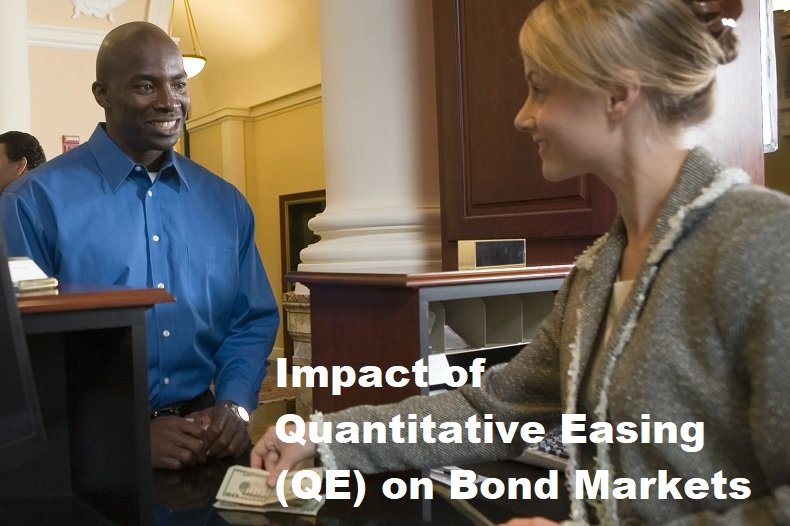Understanding Quantitative Easing
Quantitative Easing (QE) is a monetary policy carried out by the central bank as an effort to stimulate the economy when interest rates approach or reach zero. The simple definition of QE is the creation of large amounts of new money by the central bank to buy financial assets such as government bonds and other securities. The main goal of QE policy is to reduce long-term interest rates, encourage credit growth, and encourage investors to invest their money in the real economy. The workings and instruments of QE involve the purchase of financial assets by the central bank to increase the amount of money circulating in the banking system. This process is carried out by buying financial assets such as government or corporate securities, thereby increasing asset prices and reducing yields. As a result of this technique, interest rates will decrease, thereby encouraging consumers and companies to borrow money for investment and consumption.
The difference between QE and conventional monetary policy lies in the approach used. In conventional monetary policy, the central bank controls short-term interest rates by raising or lowering the benchmark interest rate. Meanwhile, in QE, the main focus is on long-term interest rates. The central bank will intervene directly in the market by buying financial assets to achieve the desired interest rate target. Although Quantitative Easing has positive goals, there are risks to be aware of. This policy could cause inflation and weaken the value of the currency if implemented for too long. Therefore, it is important for the central bank to evaluate the impact of QE on economic stability and maintain a balance between economic growth and price stability. In this context, the role of the central bank becomes very crucial in monitoring and implementing this policy wisely.
Impact of QE on Bond Markets
The impact of Quantitative Easing (QE) on the Bond Market affects both short-term and long-term interest rates. QE policies are controlled by central banks which aim to increase the money supply in the economy through large bond purchases. The result of this policy is a reduction in both short-term and long-term interest rates as the central bank injects additional liquidity into the market, which in turn reduces borrowing costs and increases investment and consumption. The decline in bond yields due to monetary easing is one of the important impacts of QE on the bond market. When the central bank buys bonds in large quantities, demand for these bonds increases, causing bond prices to rise. This higher bond price then causes the bond yield or yield to fall. This means that borrowing costs also become cheaper, which ultimately drives economic growth and spending.
Liquidity relaxation is one of the main impacts of implementing QE policies. With the purchase of bonds by the central bank, liquidity in the market increases significantly. The impact of this liquidity relaxation is also felt in the demand for bonds because investors in the market are looking for investment instruments with higher returns. As liquidity increases, bond markets can also experience increased demand creating growth in bond prices. In short, QE policies have a significant impact on the bond market. Through reducing short and long-term interest rates, reducing bond yields, and relaxing liquidity, QE policies seek to encourage economic growth and spending. On the other hand, this impact also affects investment strategies, so investors need to pay attention to the dynamics of the bond market due to QE to be able to maximize their investment.
Impact of QE on Stock Market
The impact of Quantitative Easing (QE) on the stock market is an interesting topic to discuss, especially regarding the increase in market liquidity and stock prices due to asset purchases by the central bank. QE is a monetary policy carried out by the central bank to increase the money supply by buying financial assets, such as government bonds. As a result, through the transmission mechanism, there is an increase in liquidity which affects the stock market. This provision of greater liquidity encourages investors and companies to allocate their funds into risky investment instruments, including shares, thereby driving up share prices. The relationship between QE, inflation expectations and stock valuations is another important aspect to consider. In general, inflation expectations will increase when the central bank implements QE. However, this does not necessarily have a negative impact on stock valuation. On the other hand, relatively moderate and stable inflation expectations will support market players in making investment decisions by prioritizing long-term economic growth. In this context, an increase in inflation expectations is a signal to investors that the economy is starting to recover from a crisis or slowdown, thus triggering buying interest in investment instruments such as shares.
Even though QE has a positive impact on the stock market, one must be aware of the potential negative effects that arise, one of which is the formation of stock price bubbles. Stock price bubbles occur when stock prices rise unreasonably and suddenly fall when investors flock to sell their assets. The causes of the formation of this bubble include speculation, market euphoria, and expectations of company performance that are too high. In the context of QE, abundant liquidity can trigger stock price bubbles because investors feel compelled to take greater risks in the hope of higher returns.
Reactions and Criticism of QE Policy
The response of global financial markets to the implementation of Quantitative Easing (QE) policies by various countries has varied. In general, the market responded positively to the implementation of QE, because it eased liquidity and reduced pressure on the banking system. However, the long-term effects of this policy on international markets is still a topic of debate. Some experts argue that the implementation of QE in various countries has caused a significant impact on cross-border capital flows, creating an imbalance in the international economy. There is debate regarding the effectiveness of QE in stimulating economic growth, especially when faced with sluggish economic conditions after the global financial crisis. Proponents of this policy argue that QE has succeeded in lowering long-term interest rates, encouraging investment and consumption, and reducing corporate borrowing burdens. However, critics argue that the effects of QE are likely to be temporary and insufficient to create healthy long-term economic growth.
One of the main risks of concern from monetary expansion through QE policy is the potential for high inflation. As a result of printing new money by the central bank, the money supply increases, which in turn can lead to an increase in prices. Even though inflation is currently still under control in many countries implementing QE, the debate remains relevant considering the long-term impact of this monetary expansion. Apart from inflation risks, there are concerns that QE policies could create long-term financial instability. Some experts claim that the abundant liquidity following the implementation of QE has caused an increase in asset values and formed a bubble in the financial markets. If the bubble bursts, it could lead to a financial crisis that is greater than the positive effects produced by QE. Therefore, it is important for the monetary authority to seek a balance between implementing QE policies in order to support economic growth and prevent inflation or financial instability. Strict supervisory measures and prudential steps need to be taken to ensure that monetary expansion does not lead to instability in financial markets or other negative impacts on the global economy.









